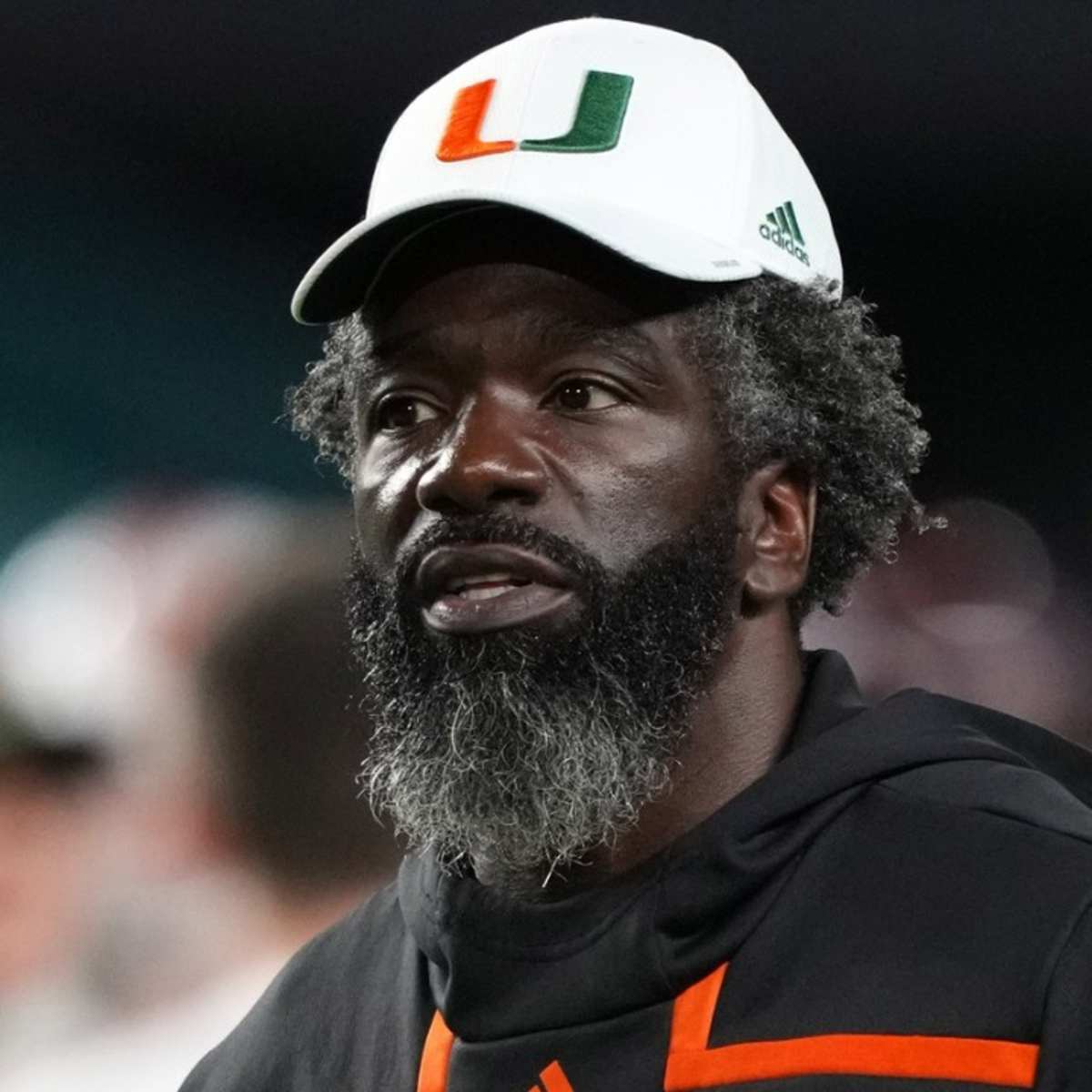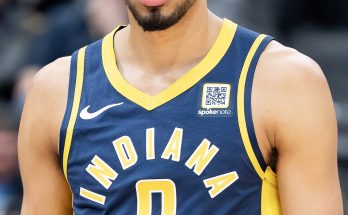The Miami Hurricanes have made a monumental announcement that has electrified the college football world: legendary safety and Hall of Famer Ed Reed is returning to the program as the Director of Defensive Culture. This news signals a new dawn for the Hurricanes, a team steeped in defensive greatness but eager to reclaim its dominance in the ever-competitive landscape of college football. Ed Reed’s return to Miami is not just a homecoming; it’s a powerful statement about the program’s commitment to excellence, culture, and the enduring legacy of Hurricanes football.
Ed Reed is more than just a name in the football world — he is an icon. Known for his unmatched instincts, game-changing plays, and cerebral approach to defense, Reed redefined the safety position during his storied NFL career with the Baltimore Ravens. His induction into the Pro Football Hall of Fame in 2019 solidified his status among the greatest defensive players of all time. But for Miami, Reed’s impact stretches far beyond his professional accolades. He is a proud alumnus who carries the rich tradition of Hurricanes football in his heart, having been a standout defensive back for the university from 1998 to 2001. His return as Director of Defensive Culture brings a wealth of knowledge, leadership, and an intrinsic understanding of what it takes to build a championship-caliber defense.
The decision to bring Reed back in this unique role is strategic. The Hurricanes are investing in their defensive identity at a time when college football offenses are more dynamic and challenging than ever. Reed’s expertise is expected to help shape the mindset and performance of Miami’s defensive unit, instilling discipline, resilience, and the killer instincts that made him one of the most feared defenders in football history. As Director of Defensive Culture, Reed will work closely with the coaching staff and players to cultivate an environment where defensive excellence is not just an expectation but a way of life. This role is about more than strategy; it is about mindset, leadership, and the intangible qualities that transform good players into great defenders.
Reed’s arrival is being met with enthusiasm from players, coaches, and fans alike. His reputation as a leader and mentor precedes him, and his presence is already inspiring the Hurricanes’ roster. Current defensive players have expressed excitement about the opportunity to learn from a Hall of Famer whose career embodies the principles of toughness, intelligence, and relentless pursuit of victory. Reed’s approach to defense—characterized by film study, anticipation, and physicality—resonates deeply with the culture Miami hopes to cultivate. For a program that has produced some of the greatest defensive minds and players in football history, Reed’s return feels like a perfect fit.
This move also reflects Miami’s broader strategy to regain its place among the elite programs in college football. After years of ups and downs, the Hurricanes are rebuilding, and a strong defense has always been a cornerstone of championship teams. The integration of Ed Reed into the staff signals a recommitment to the principles that have historically defined Miami football—toughness, speed, and an aggressive defensive mindset. With Reed involved in molding the defensive culture, Miami hopes to elevate its competitiveness, close games with defensive stops, and energize the fan base that remembers fondly the glory days when the Hurricanes defense was a nightmare for opponents.
Ed Reed’s return is also a reminder of the powerful connection between Miami football and its former players. The program has always valued its alumni and the tradition they represent, and Reed embodies that legacy. His journey from Coral Gables to the NFL and the Hall of Fame serves as an inspiring example for current players. It illustrates how the values instilled at Miami can propel athletes to the highest levels of the sport. As Director of Defensive Culture, Reed will have the unique opportunity to guide young men not only in football but in life, emphasizing the importance of discipline, education, and community.
Beyond his on-field prowess, Ed Reed is known for his football intellect and dedication to the nuances of the game. His work as an analyst and mentor in recent years has demonstrated his ability to communicate complex concepts in a way that players can grasp and apply. This skill will be invaluable in his new role, where teaching and cultural leadership are paramount. Reed understands that building a great defense requires more than raw talent; it demands preparation, film study, and a collective commitment to a defensive philosophy. His approach will likely focus on these fundamentals, aiming to develop a defense that is both physically dominant and mentally sharp.
The Miami Hurricanes’ decision to name Reed as Director of Defensive Culture is also a forward-thinking move that reflects how college football programs are evolving. Teams are increasingly recognizing the importance of culture and leadership roles beyond traditional coaching positions. Reed’s presence in this capacity will provide a bridge between the coaching staff and players, fostering communication, accountability, and a shared vision. It’s a role that fits perfectly with Reed’s personality and experience, allowing him to leverage his leadership qualities without the constraints of a typical positional coaching job.
Fans have already reacted positively to the news, with social media buzzing about the impact Reed’s involvement could have on the Hurricanes defense. The excitement is palpable, as many see this as a sign that Miami is serious about returning to national prominence. The Hurricanes have a rich history of producing outstanding defensive talent—such as Ray Lewis, Sean Taylor, and Jonathan Vilma—and Reed’s return is a continuation of that proud tradition. It’s a signal to recruits, opponents, and the college football world that Miami intends to build a defense that is feared and respected.
From a recruiting standpoint, Ed Reed’s presence on the staff is a game changer. Young defensive players will be drawn to a program where a Hall of Famer mentors and guides them. Reed’s name alone carries weight and can open doors for Miami in recruiting battles, especially when vying for top defensive prospects. His credibility and personal experience navigating the path from college standout to NFL legend will resonate with recruits and their families. For the Hurricanes, this is a valuable asset that can help accelerate the program’s rise.
The timing of Reed’s return is also significant. Miami is entering a phase where it is blending young talent with experienced leadership. The program’s coaching staff is working hard to develop players and improve in all phases of the game, and Reed’s arrival adds a critical piece to the puzzle. His influence is expected to extend beyond the defensive backs to the entire defensive unit, shaping communication, tactics, and the overall mindset. Reed’s presence promises to elevate the team’s preparation, in-game adjustments, and ability to handle pressure situations.
Looking ahead, the expectations for the Hurricanes defense are understandably high. With Ed Reed involved, the team’s defense is poised to become more aggressive, disciplined, and effective. Reed’s experience playing at the highest levels of football provides insight into what it takes to succeed against elite competition. His understanding of game dynamics, opponent tendencies, and the importance of turnovers will be invaluable in crafting a defense that can change the course of games. Reed’s influence will likely be felt not only in practice but in the locker room and on game days, where leadership and culture play critical roles.
The return of Ed Reed also has symbolic significance for Miami’s football program. It represents a full-circle moment, a reconnection with the values and traditions that made the Hurricanes a powerhouse. Reed is a reminder of the program’s ability to develop NFL-caliber talent and produce defensive legends. His role as Director of Defensive Culture suggests that Miami is focused not just on building a team, but on building a legacy—a culture that demands excellence, accountability, and pride. This culture will be critical in navigating the challenges of the competitive Atlantic Coast Conference and beyond.
In the end, Ed Reed’s return to Miami as Director of Defensive Culture is a thrilling development that excites everyone associated with Hurricanes football. It blends history, talent, and vision in a way that could propel the program back to national relevance. Reed brings more than just his name; he brings a commitment to building a defense that embodies toughness, intelligence, and a relentless will to win. For Miami, this is the start of a new chapter—one where defensive greatness and cultural strength go hand in hand. The Hurricanes have welcomed back one of their own, and with Ed Reed at the helm of their defensive culture, the future looks incredibly bright.



